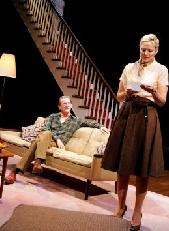SITE GUIDE
SEARCH
REVIEWS
FEATURES
NEWS
Etcetera and
Short Term Listings
LISTINGS
Broadway
Off-Broadway
NYC Restaurants
BOOKS and CDs
OTHER PLACES
Berkshires
London
California
DC
Philadelphia
Elsewhere
QUOTES
On TKTS
PLAYWRIGHTS' ALBUMS
LETTERS TO EDITOR
FILM
LINKS
MISCELLANEOUS
Free Updates
Masthead
Writing for Us
A CurtainUp  London Review
London Review
 London Review
London ReviewThe Cryptogram
|
If we could speak the truth for one instant, then we would be free.
---- Del |

Oliver Coopersmith as John, Douglas Henshall as Del and Kim Cattrall as Donny
(Photo: Tristram Kenton) |
David Mametís play The Cryptogram, about the break up of a marriage from a childís point of view, has a lasting impact beyond its slight sixty five minutes in the theatre. When we learn that as a child, Mamet himself saw his parents separate and divorce, we realise the heartfelt centre that drives this piece of writing.
Liverpool born Kim Cattrall, although whisked away to Canada at an early age, learnt her acting craft in London, and once again impresses that there is much more to this actress than her celebrity Sex and the City persona. Cattrall is supported by two remarkable performances from Douglas Henshall as Del, the family friend, and Oliver Coopersmith as the boy who is caught in this marital vortex, John.
The Cryptogram opens on the night before John is due to leave on a camping trip with his father. We never see the father onstage because he has left a note saying that the marriage is over. Already you can see how, in the childís eye, the immediacy of the loss of the holiday means more to him than the long term implications of divorce. In the course of the play, Donny (Kim Cattrall) uncovers that friend of the family Del has betrayed her by lying, providing an alibi for time spent by her husband with another woman and allowing them to use his apartment.
The dialogue brims with that distinctive Mamet style of unfinished sentences and jabbing, intercepting, interrupted conversation. You can recognise Mametís plays from the staccato rhythm of the words. The adults are very repetitive as is the boy when his stream of questions is not answered.
The Cryptogram also feels like a detective story as Donny searches for the truth. The evidence is there — a blanket with a tear in it and a hunting knife. The blanket has a romantic significance in Johnís parentsí early relationship and the knife exposes or cuts away the lies Del has told. Both of these objects have cryptic significance, the blanket as a security comforter for John but also as something which stifles truth; the knife, here a gift and the instrument of severance.
The set is dominated by a high staircase, much larger than normal in a suburban house, which comes into the living room. The designer has allowed us to see the stairs through a childís eye, a long passage into the adult world below his bedroom. The director often places the adults onstage so that they look up to John on the stairs as if he is on the periphery of their world. It seems that what we are watching is the childís memory of the events of that night and the day, weeks later, when he has to move out of his home. There are too many gaps that seem improbable from an adultís point of view, like Donnyís reaction to the note from her husband leaving her. No asking, Why? No talk about a meeting with her husband. Only a dissection of inconsistencies in Delís version of how he acquired the knife.
It is very difficult for English actors to play Mamet well, to get the timing perfect but under Josie Rourkeís direction this cast pulls it off. Cattrall in restrained chignon and tweed skirt as the 1959 Chicago wife contains her emotions for most of the play. Yes, we feel that exasperation with the childís questions and interruptions but she only shows anything other than forbearance for a brief moment towards the end of the play, and then that outburst is directed at Del. Often she is at breaking point, deep in conversation with Del, when the childís entrance forces her to break off and cover up with a fake smile. Kim Cattrall shows the intelligence of her character as she unpeels Delís deception with relentless logic. Douglas Henshall has a wide eyed innocence which makes the boy look worldly wise as he explains to the child with a patient indulgence that only those who are not parents themselves can afford. If Del is homosexual, then surrogate parenting is maybe all he may experience in 1959. But in Oliver Coopersmith, the Donmar have found a boy capable of a very well judged performance. He is totally believable in the role, the child who has to figure out the meaning of adult behaviour. Editor's Note: For more about David Mamet and links to other Mamet plays reviewed at CurtainUp, check out our David Mamet Backgrounder.
|
THE CRYPTOGRAM
Written by David Mamet Directed by Josie Rourke Starring: Kim Cattrall, Douglas Henshall With: Oliver Coopersmith, Adam J Brown, Joe Ashman Design: Peter McKintosh Lighting: Neil Austin Running time: One hour and five minutes with no interval Box Office: 0870 060 6624 Booking to Reviewed by Lizzie Loveridge based on 17th October 2006 performance at the Donmar Warehouse, Earlham Street, London WC2 (Tube: Covent Garden) |
|
London Theatre Tickets Lion King Tickets Billy Elliot Tickets Mary Poppins Tickets Mamma Mia Tickets We Will Rock You Tickets Theatre Tickets |




